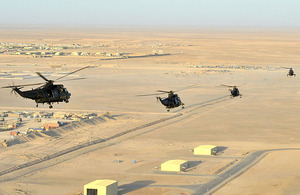Navy Sea Kings complete Afghanistan mission
The Royal Navy's Commando Sea King Mk4 helicopters have completed their final mission in support of Joint Helicopter Force (Afghanistan) and are now returning to the UK.

Sea King Mk4 helicopters of the Commando Helicopter Force make a final flypast over Camp Bastion in Helmand province, Afghanistan [Picture: Sergeant Steve Blake, Crown Copyright/MOD 2011]
Back in the UK, the crews will prepare for further contingency operations and convert to the newer and more capable Merlin helicopter.
The helicopters, crews and engineers of 845 and 846 Naval Air Squadrons, whose home base is Royal Naval Air Station (RNAS) Yeovilton in Somerset, have been deployed to Afghanistan in support of Operation HERRICK since 2007.
With the venerable Sea King Mk4 due to be withdrawn from military service in 2016, Joint Helicopter Command is withdrawing its Commando Sea King Mk4 helicopters from Camp Bastion in Afghanistan and recovering them to the UK.
The ‘Junglies’ will now be able to start the conversion process to the newer Merlin helicopter currently being operated by the RAF. The arrival of the Merlin with the Commando Helicopter Force will allow the Junglies to transport more troops and cargo with even greater efficiency and speed.
The Royal Navy’s amphibious assault specialists, the Junglies are accustomed to embarking on Royal Naval warships to deploy the UK’s Royal Marines-led amphibious forces ashore. The Commando Sea King was never designed to perform in the heat and high altitude of a country like Afghanistan but, despite this, the aircraft (that first flew in 1969) has performed admirably.
Due to its simple and rugged design, the Sea King rarely suffers any significant maintenance issues, and, when it does, it is relatively easy to repair.
The Commando Sea King Mk4 has not been the poster pin-up of Afghanistan, but it could perhaps be compared to the Hurricane fighter of the Second World War. Like the Hurricane, the Sea King has, over the years, quietly, consistently and reliably completed its tasks, never seeking to overly advertise its own success.
Nevertheless, in their four years of service in support of Operation HERRICK, the Commando Sea Kings have flown over 3,800 individual missions totalling approximately 12,500 flying hours.
They have safely transported over 80,000 personnel from many different nations around the battlefield and delivered over 700 tonnes of ammunition, water and essential war-fighting supplies.
The missions flown have been extremely varied. Examples include extracting battlefield casualties to the safety of a field hospital, inserting sniper teams into mountain observation posts, and lifting combat troops and their essential supplies into the heart of enemy territory.
The Junglies have maintained their hard-won reputation for flying skills and bravery, specialising in night-time operations, overcoming often challenging weather conditions to complete their tasks. As such they have earned the respect of the soldiers and marines that they have supported in Afghanistan, as indeed they did in the likes of Iraq, Northern Ireland and the Balkans before that.
The aircrew and engineers now look forward to being reunited with family and friends when they return to RNAS Yeovilton. After enjoying some well-earned rest and recuperation they will return to normal working duties within the UK, which will feature training for amphibious operations, desert training overseas and mountain and cold weather training in the challenging environment of Norway.
The Commanding Officer (CO) of Joint Helicopter Force (Afghanistan) and former CO of 848 Naval Air Squadron, Commander Matt Grindon, said:
The Commando Sea Kings have been hugely impressive during their time in Afghanistan; they will be missed by the troops and by my operations team, who often rely on the Sea King crews’ ability and versatility to get the job done.
Lieutenant Commander Lloyd Shanahan, as the last Detachment Commander of the Commando Sea Kings in Afghanistan, said:
I’m immensely proud to be the last Detachment Commander for Sea Kings of the Commando Helicopter Force [CHF]. My engineers have performed admirably to keep our aircraft flying in a difficult and testing environment. My thanks also go out to the aircrew, who, through their determination and will to help our troops on the ground, have made a real and quantifiable contribution to the war effort in Afghanistan.
The Commanding Officer of CHF, Captain Matt Briers RN, added:
For four years the sailors and Royal Marines of CHF have provided vital support to the people that matter - the troops on the ground. Whilst the Sea King is reaching the end of its life we now have the certainty of a new aircraft type to take the Force forward and return to our core role of supporting the Royal Marines in the maritime contingent role.
We leave Afghanistan offering our best wishes to those that continue to serve in Afghanistan.